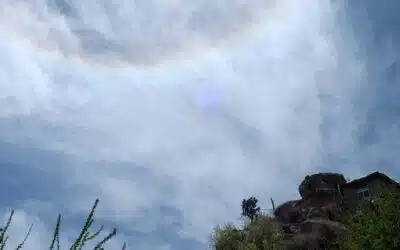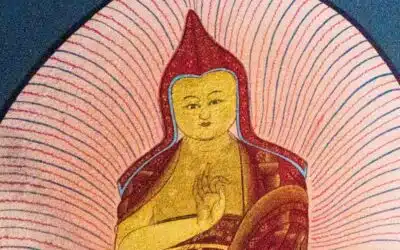The Old Age

Written By Johanne Bernard
Blog | Culture and tradition | Reflections on life | The Dzogchen basics
In this article “The Old Age”, the third on a series on existence, Johanne talks about old age, time flying and what it means for Dzogchen.
The Old Age, a String of Pearls
Is there a precise moment when we begin to grow old? Could we identify a day, a date, a time that would mark that moment when we first say to ourselves: “This is it. This is it. This is old age”? Perhaps the time when we looked at ourselves in the mirror and asked ourselves: “Who is this old person I see in front of me? The evening when, alone in our room, we realised that we could no longer bend down to untie our shoes? Or the day when, looking for the name of an old acquaintance, we realized that our memory was not as good as it used to be?
When do we begin to age? Is it possible to determine what would be ‘the beginning of old age’?
From the moment we are conceived, our cells evolve. First of all, they multiply and develop. That is what we call ‘growing’. They change, sometimes, that is what we call ‘sickness’. And then they degenerate and die, that’s ‘ageing’. Well, that’s the biological aspect, because in reality the fear of old age is specific to each person. It depends on how we perceive our body and what we expect from it. Often the feeling of growing old is associated with the loss of our full physical and mental capacity. It is the mirror image of youth, the time when we thought we were at our best… But this is still very subjective. A genetic study explains that our metabolism reaches the maximum of its capacities at the age of one year and that the rest would only be stability and then decline… One year, the beginning of old age? In another study, a Harvard geneticist claims that old age does not exist, that it is a disease that can be cured…

“If we were to put side by side all the pictures we have of ourselves since we were born, we would see that each picture is both ‘us’ and someone else… We are both the child of yesterday and the old man of tomorrow.”
The Old Age and Dzogchen
In the Dzogchen tradition, it is said that degeneration begins at birth, or more precisely, that birth already carries illness, old age, degeneration and death. Everything is there from the beginning. Everything is present at the base: as soon as existence begins, from conception, everything is there. So the question is not when does old age begin, but why can the idea of old age and degeneration frighten us?
If we were to put side by side all the pictures we have of ourselves since we were born, we would see that each picture is both ‘us’ and someone else… We are both the child of yesterday and the old man of tomorrow. We are no more the child of yesterday than we are the old man of tomorrow… All these images that represent us at different ages seem to us to be connected by what we think is a ‘continuity’. But in reality this ‘continuity’ is not permanent. The individual is connected to a self. But this self is subject to change and has an end, and it is perhaps this, at the bottom, that concerns us.
In Dzogchen we do not speak of ‘continuity’, of uninterrupted experiences that would somehow form existence, but of a multitude of experiences, all of the same nature, that of mind, and all of the same base, the primordial base of mind… A multitude of experiences, expressions of the self and of reality, like so many beads in a rosary, the thread that carries them being of the same nature as the beads themselves: empty and luminous.
All that we believe to be existence or continuity comes from our mind. To recognize the primordial basis of mind in all phenomena, to recognize that the beads are of the same nature as the thread that carries them, is to recognize that degeneracy is also the natural expression of mind. Degeneration cannot affect the mind. It is the idea of self that is affected.

“Now that you have the time, observe the nature of mind – that alone makes sense”, said Machik Labdrön, a great 11-12th century Tibetan practitioner, in her last teaching to her students before she died at the age of 99.
”When you have seen your own nature, through the truth of it, because of emptiness, the mode of being, or how you are, is what is known as ‘Buddha’, and you look for nothing else“, writes Ayu Khandro, a Dzogchen master who lived to be 113 in 19-20th century Tibet. (“Advice from the Dakini’s Heart, Glorious Indestructible Lamp”) [1].
Observe the essence of the mind, to discover that the reality of the self, and therefore old age, is illusory. Do not look for anything else, for once the essence of mind is recognized in all phenomena, all that remains is to remain in relaxation…
These are the precious advices left to us by two amazing female practitioners, two yoginis who lived to a ripe old age. Perhaps this is the essence and heart of Dzogchen practice… whatever our age!
[1] You can find a translation by James Low HERE.
More Posts
Being Your Own Master
Relationship with a master requires discernment. “Being your own master” offers insights into understanding devotion and avoiding pitfalls.
Phenomena
"Phenomena" is the second entry in a new category designed to improve understanding of essential Dzogchen words and concepts.
The Story of the First Masters: Manjushrimitra
We continue the Stories of the First Dzogchen Masters with Manjushrimitra, who structured the verses of Dzogchen into three series.



